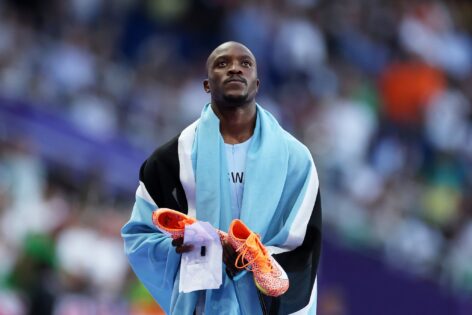Think back to 1980, Botswana’s first-ever appearance at the Summer Olympics in Moscow. Since then, they’ve been showing up at every game, but guess what? No Olympic gold. Not once. Especially in track and field, where they’d come close but never quite cracked the code. Then, out of nowhere, Letsile Tebogo storms onto the scene in the 2024 Paris Olympics. He smashes the men’s 200 meters in 19.46 seconds, breaking the African record and snagging Botswana’s very first Olympic gold in athletics. And now he’s the first African ever to win the Olympic 200m title. Mic drop. Now, in 2024, Tebogo’s gearing up to light up the Diamond League, but hold up, before he even hits the track, he’s already shaking things up with some major financial demands that have everyone buzzing. What’s the story there?
Letsile Tebogo is gearing up for a massive weekend at the Rabat Diamond League on May 25th, where he’ll take on the brutal challenge of running both the 100m and 200m just an hour apart. The competition is fierce, with South Africa’s Akani Simbine, Kenya’s Ferdinand Omanyala, and America’s Fred Kerley all chasing gold. Tebogo knows it won’t be easy, but he’s aiming for a rare sprint double that could cement his spot among the world’s fastest.
But before that, he gave a bit of a reality check. In a recent FloTrack interview, Tebogo opened up about what really makes Botswana and Africa as a whole so special in athletics. “It’s not just Botswana. The whole African continent has true potential,” he said. And he’s not just talking; Africa has produced sprinting stars like Nigeria’s Divine Oduduru and South Africa’s Akani Simbine, while Kenya and Ethiopia dominate distance running globally.
But for years, many African athletes lacked the opportunities and resources to shine on the biggest stages. We know many African countries don’t have enough high-quality training centers, tracks, gyms, or sports science labs. Without these, athletes can’t train at the level needed to compete globally. Even investing in sports infrastructure and athlete development requires money.
Many African nations have limited budgets for sports, and sponsors tend to focus elsewhere, so resources are scarce. Also, top-level coaching, nutritionists, physiotherapists, and sports psychologists are often concentrated in Europe and the U.S. For African folks, there is not enough support when it comes to boosting performance and speeding up recovery.
Due to these shortages, young athletes may need to go to Europe, America, or other states with better equipment for training. This approach provides a benefit to individuals, but it does not contribute much to building sturdy local sports infrastructure in Africa. Letsile Tebogo explained, “Over the years, people just weren’t given the opportunity. But I’m glad we’ve paved the path for us, and now I’m paving the path for everybody else.”
He added that although the country’s sprint team was unable to attend the recent World Relays, they showed promise, and he believes there will be “new faces on the track” participating at next year’s events since Botswana will host the event next year. He called on sponsors and investors to notice the many opportunities available in Africa that are not yet well-known.
“There’s so much potential in Africa that people don’t see yet.” We also understand that Sponsorships pay for training, improve athletes’ visibility, motivate young sports fans, and support the development of overall sports programs. Remember, after Tebogo won the Olympic gold medal, that’s when a lot of offers appeared. Since joining DLA Piper Africa as a partner and becoming De Beers’ face, Tebogo’s influence has grown dramatically.
Even Park27, one of the local restaurants nearby, promised to donate P10,000 monthly towards his training. But the most notable event was in April 2025 when Red Bull brought him on, giving him company with a bevy of top-rated athletes around the world. That’s impressive for a 21-year-old driving hard and transforming sponsorship for African athletes in sports.
Letsile Tebogo demonstrates how much talent can be uncovered. And now this year, Tebogo will make his debut in Diamond League races, but many are wondering if he can complete his first-ever double. Well, he thinks so.
Can Letsile Tebogo make history in just one hour?
Can Letsile Tebogo pull off the impossible? That’s the big question ahead of the Rabat Diamond League on Sunday, May 25, where Botswana’s golden boy is set to race both the 100m and 200m, just one hour apart. For the reigning Olympic 200m champion, this is uncharted territory. “This is the first time I’m doubling in a Diamond League,” Tebogo shared.
“I don’t know how I’m going to be doing that one hour, but I feel like it’ll be a fruitful one—just to get the legs rolling and heated up.” And it’s not just any double: he’ll be toeing the line against the likes of Fred Kerley, Akani Simbine, and Ferdinand Omanyala in the 100m. No pressure, right? But Letsile Tebogo isn’t letting the moment overwhelm him.
He’s focused, real, and refreshingly honest. “Winning both races will definitely be a good night for me, but I don’t want to put myself under that pressure,” he said. The 21-year-old knows all eyes are on him, not just as a sprinter but as a symbol of rising African talent. His coach is confident in the 200m, but the 100m still has some kinks. “There are still a few things that need to be fixed,” Tebogo admitted, “which we’re going to see if we’ve corrected in the past few days.”
Whether he walks away with two wins or not, one thing’s for sure: the sprint world will be watching, and so will the next generation of African stars he’s inspiring.
The post Letsile Tebogo Makes Major Financial Demand as Track and Field Star Urges Sponsors to Pay Notice appeared first on EssentiallySports.
